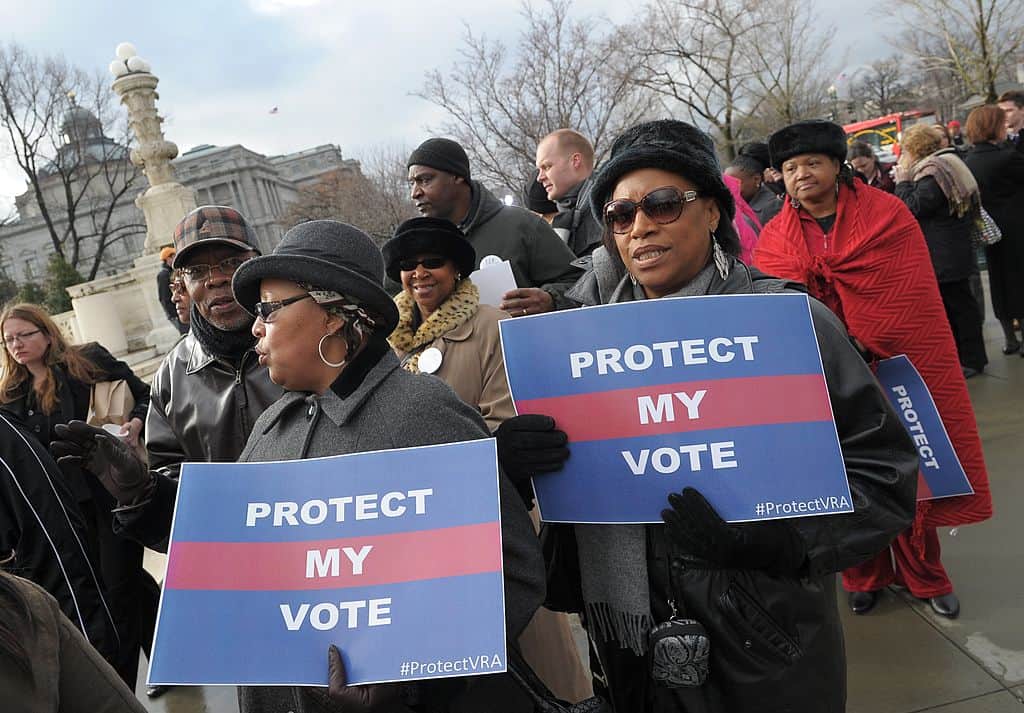In a press conference on Tuesday highlighting Texas Republicans latest push on voter suppression bills, Black faith leaders from across the state asked Gov. Greg Abbott for a meeting to discuss voting legislation.
In addition to the meeting, leaders also asked constituents to participate in the Push Democracy Forward and the Austin Justice Coalition Prayer and Justice March on Voter Suppression at the steps of the Austin Capitol on July 15.
According to Dixon, buses will be provided in cities across the state for constituents who want to participate in the march.
“Texas is headed toward a dangerous tipping point,” Bishop James Dixon, President of the Houston chapter of the NAACP said. “We are indeed a state and a nation in crisis.”
The Black clergy said they are hoping to provide spiritual and moral leadership in the community regarding voting rights.
“We intend to make it clear that this issue is more than political,” Dixon said. “People are being misunderstood and the truth is being misrepresented.”
Dixon also said the Black clergy will be sending an open letter to non-Black clergy colleagues to meet and stand in solidarity.
“We all read from the same Bible thus we should be able to stand together for justice,” Dixon said.
Furthermore, Rev. Frederick D. Haynes III said Austin is the new Selma.
“We’re coming to Austin to say Texas, America, you must be born again,” Haynes said. “Voter suppression and democratic subversion taking place in Texas is a result of an addiction to the big lie and it’s connectected to the terrorist sedition of Jan. 6.”
President of the The Next Generation Action Network and Minister Dominique Alexander thanked Texas Democrats for leaving the state earlier this week and fighting for voters.
“Although our state representatives are not here right now the fight is not over,” Alexander said. “We must continue to stay down there and stand in the gap.”
The press conference also highlighted Crystal Mason and Hervis Rogers cases who were both charged with allegedly voting illegally.
Mason was sentenced to five years in jail for attempting to submit a provisional ballot in the Nov. 2016 election while on supervised release in Tarrant County.
Her vote was never counted in the election, and like Rogers, was unaware of her voter eligibility.
“They never told us that we were ineligible to vote,” Mason said. “I don’t get out of prison and get right on track with a great job working, open up a youth center for kids in my name to go back to prison for voting.”
After her release, Mason said she started her own organization to educate others on the importance of voting and learn their voting eligibility.
Mason also emphasized she stands in solidarity with Rogers, who is now being charged by Texas Attorney General Ken Paxton.
The American Civil Liberties Union who is representing Rogers also made an appearance at the conference.
Rogers, a Black man from Houston, waited in line for six hours March 2020 to cast his ballot for the Super Tuesday Primary. Now, he is facing up to 40 years in prison for allegedly voting illegally.
Rogers was arrested last week by Paxton’s office for two counts of second degree illegal voting. He was released on Saturday after The Bail Project helped Rogers pay for his $100,000 bond.
During the time he cast his ballot, Rogers only had four months left on parole after serving a 25-year sentence.
According to the AG’s office, the person commits the offense if they knowingly vote or attempt to vote in an election in which they know they’re ineligible.
Paxton’s office is charging Rogers in Montgomery County, a rural county 37 miles away from where the alleged crime was committed. Paxton tweeted on Friday that “Hervis is a felon rightly barred from voting under TX law.”
According to Montgomery County records, Rogers allegedly committed the crime on Nov. 6, 2018 and March 3, 2020.
His arrest comes after a long weekend of Texans testifying against Republicans’ latest voter suppression bills, House Bill 3 and Senate Bill 1 in the special session called by Abbott earlier this month.
If passed, HB 3 and SB 1 would ban drive-thru voting, 24-hour voting and the distribution of mail-in ballot applications. It would also require new ID requirements for voting by mail and monthly citizenship checks.
Photo: MANDEL NGAN/AFP via Getty Images
Kennedy is a recent graduate of the University of St.Thomas in Houston where she served as Editor-in-Chief of the Celt Independent. Kennedy brings her experience of writing about social justice issues to the Texas Signal where she serves as our Political Reporter. She does everything from covering crime beats, Texas politics, and community activism. Kennedy is a passionate reporter, avid reader, coffee enthusiast, and loves to travel.





